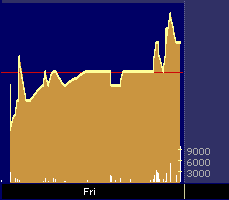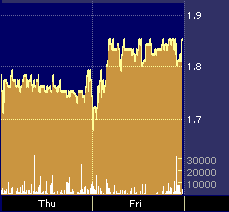
Who Is Next After Kana and eGain?
Who Is Next After Kana and eGain?
by Hal Plotkin,
Silicon Valley Correspondent
Post-IPO stock-price surges for both eGain Communications Corp. and Kana Communications, Inc. bode well for several other similar pre-IPO companies serving the same fast-growing market.
On Tuesday, Kana’s stock shot up more than 200% from its initial offering price of $15. Likewise, eGain’s stock price skyrocketed after the company’s Wednesday IPO, which priced at $12 and rose $11, or 92%, to finish at $23. The strong performance reflects investor confidence in the fast-growing market for automated email response systems.

EGAN intraday stock chart

KANA 2-day stock price chart
eGain, based in Sunnyvale, Calif., and Kana, based in Palo Alto, Calif., serve overlapping markets. Both companies sell software that helps large web sites automate the process of responding to incoming e-mail.
eGain is also a leading developer of real-time online customer service applications that allow businesses to interact directly with consumers while they’re online. “eGain offers a range of communication options, including e-mail and real-time applications, that have the potential to enable a more satisfying customer experience,” says Barrett Coakley, senior analyst at International Data Corporation. eGain’s customer service application, called the Web Collaboration System, won a “Best of Show” award at the recent Internet World trade show in Chicago. The company posted a loss of $11.3 million on slightly over $1 million in revenue for the year ended June 30, 1999.
Kana, based in Palo Alto, California, was founded in April 1997 with $700,000 in seed financing provided by Draper, Fisher, and Jurvetson, a venture capital firm based in Redwood City, Calif. Since then, several other venture investors, including Benchmark Capital, Stanford University, and New Millennium Partners have invested a total of $26.5 million in the company. For the quarter ending March 31, 1999, Kana posted sales of $1.4 million dollars, with losses totaling $1.845 million.
Kana and eGain are benefiting from a rapidly increasing need for automated email response systems. Many of the Internet’s most successful web sites are already buckling under a growing avalanche of incoming email. The ability to respond quickly and accurately to incoming email provides a major competitive advantage to companies doing business on the Internet.
Other firms in the pre-IPO pipeline that are also serving this market include Brightware, Inc., based in Novato, Calif., Acuity Corporation, based in Austin, Tx., and YY Software, Inc., also based in Palo Alto.
Acuity was acquired by Quintus Corp., a Fremont, Calif.-based automated customer service company, on Sept. 10, 1999, which then filed to go public that same day. So expect Quintus/Acuity to pop up on the IPO radar in mid-December.
Judging by the numbers, it looks like there’s plenty of business to go around.
According to a recent survey conducted by Brightware, for example, only 15 percent of the top 100 companies on the Fortune 500 list were able to answer a very simple e-mail inquiry within three hours.
Another 36 percent of these firms either couldn’t be contacted by e-mail through their web site at all, or made it so difficult few were likely to accomplish the feat.
It took Bell Atlantic, for example, more than a week to respond to a simple query — “what is your corporate headquarters address?” — sent to the e-mail address listed on its Web site. Several other major companies, including Home Depot {HD}, MCI {WCOM}, RJR Nabisco {RJR}, and United Technologies {UTX}, hadn’t responded at all by the end of the thirty-day survey period.
The software produced by automated e-mail response companies uses artificial intelligence to analyze the meaning of incoming e-mails.
Drawing information from a customer’s preexisting database, the software drafts responses to e-mails and forwards them directly to the person who sent the e-mail, or to company personnel for further review.
Companies can save a lot of money by using software that automates the process of responding to email. It costs companies about $2.75, on average, to manually answer an e-mail compared with about 25 cents to answer an e-mail with the help of automated e-mail response software, according to Forrester Research, based in Cambridge, Massachusetts.
The market for this kind of software is projected to grow at a compound annual rate of 116 percent, reaching $2 billion dollars by 2003, up from just $42 million in 1998, according to International Data Corporation (IDC), based in Framingham, Mass.
“This is a critical category of software because it solves one of the thorniest problems on the Internet — web site abandonment,” says Albert Pang, research manager for IDC. “The market for this category of software is expected to grow explosively,” he says.
Despite the strong post-IPO performance of both Kana and eGain, there’s little reason to think the two companies will be able to corner the market for automated e-mail response software. The enormous size of the still-growing market leaves plenty of room for competition. The number of e-mail messages sent worldwide each day is projected to grow from about 1.9 billion last year to more than 4 billion by the end of 1999, according to Pioneer Consulting, based in Cambridge, Mass.
Several other contenders, most notably Brightware, say their products do a better job drafting accurate answers to e-mails that contain multiple, or vague, questions. Brightware counts Bank of America, Neiman Marcus, and Amway among its more than two dozen largest customers.
Kana, though, also has its backers. According to Charles Rider, an analyst with the Patricia Seybold Group in Boston, Massachusetts, Kana has a “well-thought out and complete solution for companies that want to implement a call center-style solution to the challenge of high volumes of customer e-mail.”
Kana’s current customers include Pacific Bell, Netscape, and eBay, Inc. {EBAY} Taken together, Kana’s 148 customers already answer approximately 4.2 million e-mails per week using Kana software.
In addition to rivals selling similar software, Kana and eGain are also facing growing competition from the vendors of traditional phone-based call center services who are rapidly integrating email response services into their existing product lines. San Jose-based Quintus, Inc., for example, another company in the pre-IPO pipeline, is reselling Brightware’s e-mail response software along with the company’s call-center products so customer service personnel can quickly review a customer’s previous e-mails whenever they call in for assistance.
Unlike many currently popular Internet stocks, the strength of these companies is that they don’t rely on revenues from consumers or advertisers.
Instead, their products are needed by any business that operates on the Internet. In the Internet’s rapidly-developing war of attrition, Kana, and the other vendors of automated e-mail response software, are selling munitions.
So, don’t worry if you missed out on getting into the eGain and Kana IPOs early. There are sure to be some other strong contenders going public in the burgeoning automated email response systems market before too long.


